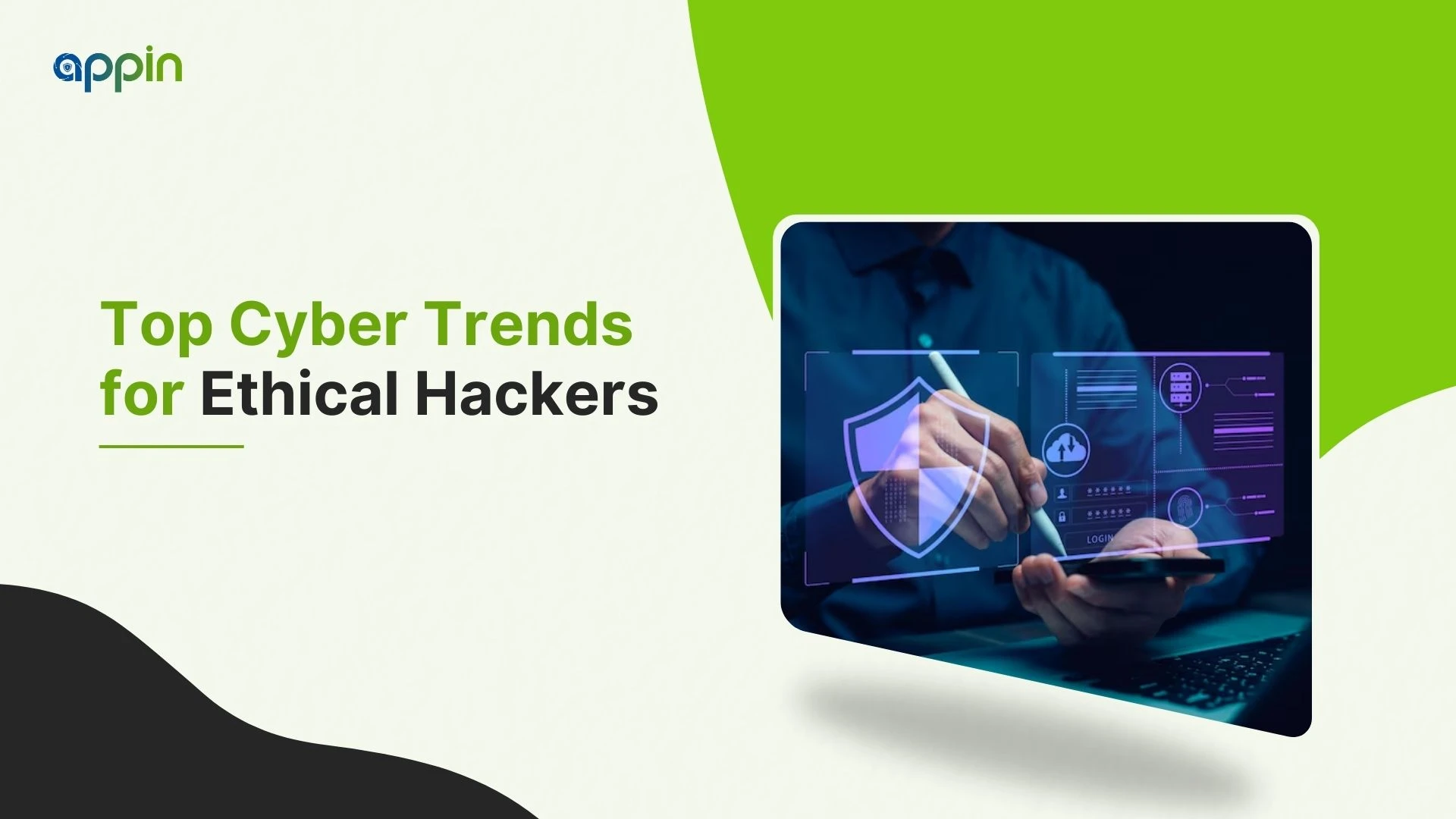The cybersecurity landscape is advancing rapidly in 2025. Threat actors are evolving their techniques just as fast as technologies are improving, which means ethical hackers can’t afford to rely on yesterday’s tactics. Staying ahead requires more than just technical knowledge, it demands strategic awareness of the cybersecurity trends ethical hackers need to watch closely to stay effective.
Whether you’re exploring vulnerabilities in networks, probing cloud infrastructures, or sharpening your skills with hands-on testing tools, it’s clear that ethical hacking is no longer just about defense. It’s about foresight.
These 10 trends don’t just reflect new tools or buzzwords. They shape the very foundation of how ethical hackers will test, secure, and think about systems moving forward.
Let’s explore them clearly and practically.

1. AI-Driven Threat Detection is Getting Smarter
AI is no longer a buzzword, it’s now part of everyday cybersecurity tools. It’s helping systems spot threats faster than a person ever could.
These smart systems learn from past attacks and can recognize signs of danger early, often before the attack fully happens. That means many threats are stopped before they cause any harm.
As someone working in ethical hacking, it’s important to understand how these systems work. You’ll need to test them, find weak spots, and learn how to stay one step ahead.
Tools that use AI to watch for attacks are now common in businesses. If you understand how they function, you’ll be much better prepared to test real-world defenses.
2. Zero Trust Architecture is the New Standard
The old way of trusting users or devices inside a network is fading out. Now, the idea is simple: don’t trust anything automatically.
Every user, device, or system must prove it’s safe before getting access. This applies at all levels, not just at the front door.
As an ethical hacker, this means your job is changing. You’ll need to test how well these rules are applied, even between systems inside the same network.
Since many attacks start from inside the organization, Zero Trust is designed to limit damage quickly. It expects that something will go wrong, and it’s built to contain it fast.
As organizations adopt stronger internal defenses like Zero Trust, there’s a growing need for professionals who understand how to ethically probe these systems. Enrolling in a Cyber Security Certification Course can provide both foundational knowledge and hands-on experience, giving ethical hackers the tools they need to stay ahead of evolving architectures.
3. API Security Takes Center Stage
Modern apps rely heavily on APIs — the parts that let different systems talk to each other. But these connections are also prime targets for attackers.
If an API is set up poorly or hasn’t been updated, it can leak private data or allow unwanted access.
As someone learning ethical hacking, your focus should include testing these APIs. Look for issues like sending unexpected input, weak access controls, or data being exposed.
Familiar tools like Postman and Burp Suite can help you simulate real-world attacks. It’s also smart to learn from trusted resources like the OWASP API Top 10, which highlights the most common API security risks.
4. Quantum-Resistant Encryption is On the Radar
Quantum computing is still emerging, but it’s already influencing how we think about data security.
Traditional encryption methods, like RSA, may not hold up once quantum machines become powerful enough. That’s why there’s growing attention on new encryption techniques designed to resist future quantum threats.
If you’re working in ethical hacking, it helps to stay informed about these changes.
Understanding how encryption works and how to test its strength will give you an edge as these new standards become more common.
Being ahead of the curve here means you’ll be better prepared to secure systems in the years to come.
5. Cloud Misconfiguration is Still a Leading Risk
Even though cloud systems are widely used, missteps in setup are still a major reason for security breaches.
Common issues include exposed storage, weak user permissions, or open network access. These mistakes leave systems vulnerable, and they’re often easy to avoid.
As an ethical hacker, this is an area where you can make a real impact. By learning how different cloud platforms like AWS, Azure, and GCP are structured, you’ll spot these weak points faster.
There are also helpful tools, like ScoutSuite, Prowler, and Pacu, that can scan for misconfigurations automatically and make testing more efficient.

6. Supply Chain Attacks Are Getting Personal
More and more attacks are coming through the tools and services companies trust every day.
That includes code libraries, browser plugins, and software used in development processes. If just one trusted piece gets compromised, it can give attackers a way in without touching the main system directly.
Ethical hackers need to think like attackers and test what happens when these “safe” components are no longer safe.
Using frameworks like MITRE ATT&CK can help you understand how attackers move through systems and where to intervene.
7. Deepfake and Synthetic Identity Threats Are Rising
Deepfakes, manipulated audio, video, and images, are becoming more complex and dangerous.
What was once a novelty or a curiosity has now turned into a major security threat. Hackers are using deepfake technology to mimic voices and create fake identities, making phishing attacks more convincing and harder to detect. This goes beyond the typical email scams we’re used to seeing.
As an ethical hacker, your role is expanding to test and challenge systems that rely on biometric data (like voice recognition or facial scans). For example, deepfake audio could be used to impersonate a company executive, tricking staff into transferring sensitive data or funds.
Testing these systems for vulnerabilities and understanding how synthetic media can bypass traditional verification methods is becoming a critical skill for any ethical hacker.
8. Ransomware-as-a-Service Has Matured
Ransomware, once just a form of malware, has evolved into a full-fledged business model, making it even more dangerous and widespread. Cybercriminals no longer need to develop their ransomware from scratch. Instead, they can purchase or rent pre-built ransomware kits, complete with customer support and dashboards to track attacks. This trend has made ransomware more accessible and streamlined for cybercriminals, allowing them to launch attacks with greater ease and efficiency.
For ethical hackers, this means you need to focus on testing defense mechanisms against these organized, commercially available ransomware attacks.
Key areas to focus on include:
- Backups: Ensuring that systems have secure and reliable backup processes in place to recover from ransomware attacks without losing critical data.
- Segmentation: Verifying that your network is segmented effectively to prevent ransomware from spreading across the entire infrastructure.
- Response Plans: Testing and refining incident response plans to ensure that teams can quickly react to and contain a ransomware attack.
Additionally, behavior-based detection tools are critical in identifying ransomware before it causes harm. These tools focus on detecting unusual system behavior that could indicate the presence of a ransomware attack, allowing for a proactive response.
As threats become more professionalized, ethical hackers must also level up. A Certified Ethical Hacking Course helps security professionals develop skills in ransomware detection, response strategy testing, and breach containmen, exactly the type of expertise needed in this high-stakes environment.
9. Security Automation is Becoming a Baseline
In today’s fast-paced cyber threat landscape, manual responses to security incidents simply can’t keep up. Attack speeds have increased dramatically, and waiting for human intervention is no longer a viable strategy to mitigate risks. This is where security automation steps in as a critical solution.
Security Orchestration, Automation, and Response (SOAR) platforms are designed to automatically detect and respond to security incidents. They use pre-defined workflows, or playbooks, to handle threats quickly and efficiently. These systems can automatically:
- Detect unusual activity or potential attacks
- Trigger appropriate responses, such as isolating affected systems or blocking malicious traffic
- Help security teams focus on higher-level decision-making rather than manually handling routine tasks
For ethical hackers, this means that testing and defending against automated systems becomes essential. You need to understand how these automated playbooks function, including:
- How to trigger automated responses to simulate attacks and test the system’s reaction
- How to bypass or manipulate these automated responses to find potential weaknesses or flaws in the playbooks
The key takeaway is that speed is everything. The faster you can identify and address a weakness, the less damage a cyberattack can cause. Security automation helps ensure that defenses are swift and consistent, but ethical hackers play an essential role in ensuring that automation systems can handle emerging threats effectively.
10. Privacy by Design Is No Longer Optional
With tighter global data regulations, privacy must be integrated into systems from the start, not added as an afterthought. Privacy by Design ensures that privacy considerations are fundamental to the architecture and operation of systems.
For ethical hackers, this means:
- Data minimization: Ensuring only the necessary data is collected and stored, and unnecessary data is discarded.
- Encryption: Protecting sensitive data both when it is stored and while being transmitted, to prevent unauthorized access.
- Secure access controls: Making sure that only authorized users or systems have access to sensitive data. Implementing role-based access control (RBAC) and multi-factor authentication (MFA) is are crucial practice.
Key global data privacy regulations like the General Data Protection Regulation (GDPR) in Europe, the California Consumer Privacy Act (CCPA) in the U.S., and India’s Data Protection Bill (DPDP) have reshaped how companies handle user data. These regulations have influenced how applications are designed, ensuring that privacy is embedded into the system architecture from the outset.
For ethical hackers, this expands the scope of testing. Rather than just searching for data leaks or unauthorized access, you are now also assessing:
- Whether data is being collected responsibly
- How data is protected through encryption and secure access
- Whether systems comply with privacy laws like GDPR and CCPA
Ethical hackers now have the responsibility to test for responsible data handling, ensuring that organizations follow best practices not only for securing data but also for maintaining compliance with privacy laws.

Ready to Dive Deeper?
Appin helps you go beyond reading about trends. Our ethical hacking training combines real-world labs, expert mentors, and up-to-date tools that reflect the 2025 threat landscape.
Whether you’re starting your journey or sharpening advanced skills, Appin gives you the clarity, structure, and support to master ethical hacking in a fast-changing world.


